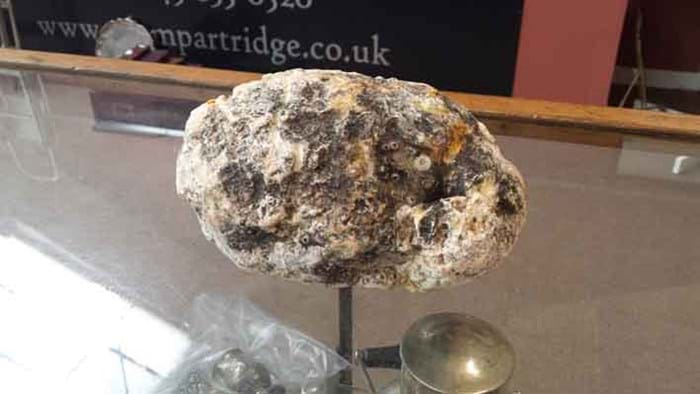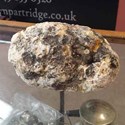That is exactly what auctioneer Adam Partridge wants you to do. In this case, the particular nature of the vomit explains all: whale vomit.
It could also be faeces...
This lump is otherwise known as ambergris and is used in the perfume industry, making it very valuable.
Which is why the estimate given by the auction house, who have salerooms in Macclesfield and Liverpool, could be a conservative one even at £5000-7000. The yellow and black lump, weighing just over 1kg, will be offered in the September 24-25 sale.
Partridge says he has never seen one like this before at auction. The price received will be dependent on the quality.
Valuable Find
"Ambergris is formed in a sperm whale's digestive system and is passed either as vomit, or as part of the faeces," he says. Scientists believe it is used to coat irritating objects in the whale's intestines.
Partridge's colleague Oliver Hancock adds: "The vendor was walking his dog on a beach in Anglesey [the Welsh island off the north-west coast] when he came across it. He thought it might have some value and got in touch with us."
The BBC reported in January last year that an Anglesey man who was out looking for bait with a friend found a lump of ambergris on a beach. Hancock says: "I don't think ours is the one in the article as it occurred more recently than that. Also the one in the article looks bigger than our bit."
That BBC story quoted Prof Michel Kaiser, of Bangor University's marine ecology department, saying: "My understanding of ambergris is that it's used in the perfume industry to enhance the scent or prolong the duration with which the scent lasts."
It has been used for centuries for expensive perfumes, as it traps aroma on the skin for long periods.
"Of course, it is illegal to actually trade in the substance in countries such as the US, but when ambergris is found washed up on the coast it's rather like treasure trove," added Prof Kaiser.
"Obviously the animal hasn't been killed illegally, it's just been discharged by the animal through a natural process."
Beachcombing in Anglesey may become a popular pastime.









